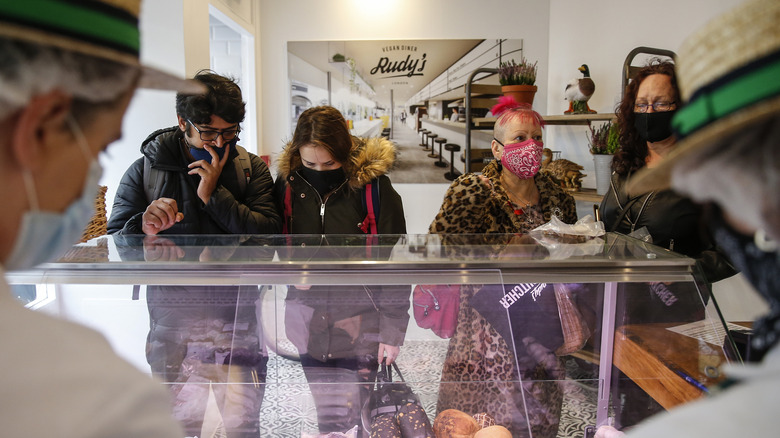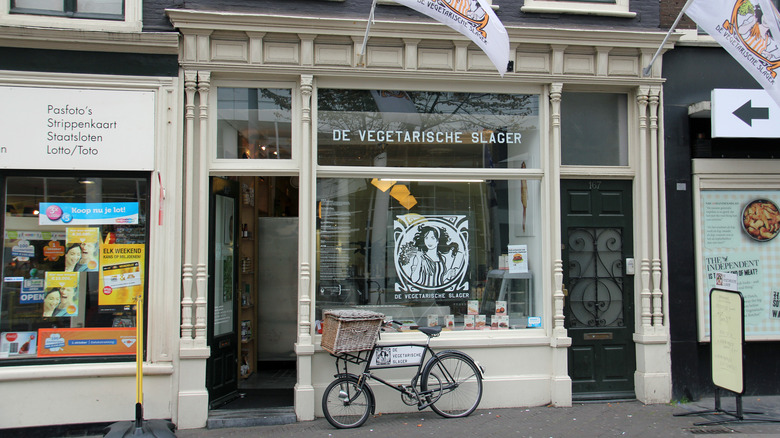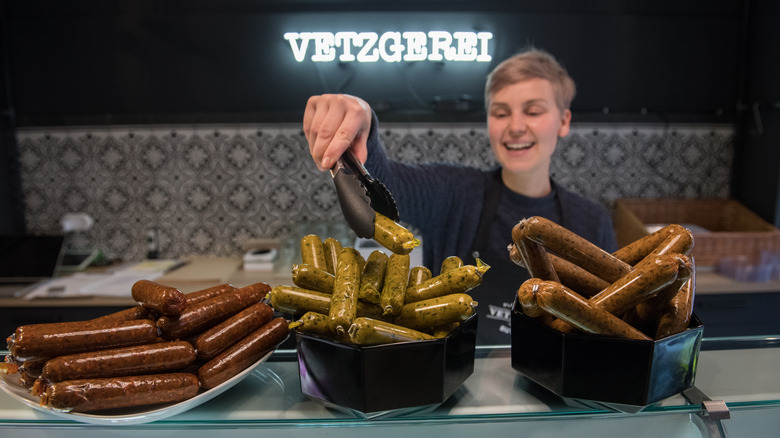Everything You Need To Know Before Visiting A Vegan Butcher
However idiomatic the concept of visiting a vegan butcher may sound, it seems to be working. As storefronts arise around the world, taking a meat-free approach to a traditionally meat-full business model, queues stretch out the doors, and deli cases run empty (via All Plants). As it turns out, vegans also enjoy the experience of visiting a specialty butcher, even if the meats are mocked.
Mock meats have a history that traces back to the Han Dynasty in China, where they were first eaten by Mayahana Buddhist monks. After making their way across Japan and Indonesia, mock meats were first brought to the West in the 1800s, when it was recommended by doctors to diabetics, and gained popularity in the US during the 19th century when the Christian denomination, the Seventh Day Adventists, promoted them (via LinkedIn).
What was then named seitan, a wheat gluten-based meat substitute, is still widely consumed today — only now, the mock meats trend has become even more experimental. The modern-day rise of vegan butcheries and their shelves of meat-less bacon, meatballs, and steaks has allowed a change of attitude toward plant-based eating: One that sees veganism as a lifestyle change that no longer has to compromise your favorite food.
History and key locations
The first plant-based butchery in history began with Jaap Korteweg, who opened his shop, The Vegetarian Butcher, in the heart of the Hague, South Holland, in 2010 (via The Vegetarian Butcher). Today, you can find their vegan meats on the menus of big retailers like Burger King, Dominos, and Starbucks locations across the U.K. (via The Vegetarian Butcher). Six years later, just across the pond, the first vegan butcher shop appeared in the U.S. — and no, it wasn't in Los Angeles or Portland, but in Minneapolis, Minnesota, a city ranked 18th on Forbes' list of vegan cities.
Starting in Minneapolis, The Herbivorous Butcher pioneered the vegan butcher movement in North America in 2016 and was followed by the opening of The Very Good Butchers, another vegan butcher shop in Victoria, Canada, a year later (via VegNews). In the years since, dozens of plant-based butchers have opened in cities from Yamchops in Toronto to Monks Meats in Brooklyn, and to The Butcher's Son in Berkley, California.
What you'll find
There are a few differences when shopping at a vegan butcher — besides the obvious fact that the meat is made from plants, not animals. Like a typical butcher shop, vegan butchers have a range of selections, including ribs, chicken, salmon, or burger patties. There are seasoned and unseasoned options, seasonal grill kits, and artisanal vegan cheeses. However, when shopping for vegan meat, don't expect an exact replica of the animal meat.
When creating their plant-based cuts, vegan butchers look at animal meat as the "North Star," as the owner of Abbot's Butcher in California, Kerry Song, told USA Today. The goal is to recreate the flavor profiles, textures, mouthfeels, and smells associated with animal meat and make a vegan counterpart that stands up to traditional culinary processes and techniques. As Chris Kim, co-founder of Monks Meat, told USA Today, "Our flavor profiles are designed to work with different spices and traditions and our 'cuts' are meant to stand up to smoking, grilling, braising, stewing, brining, etc."
Therefore, shopping for meat at a vegan butcher varies from a traditional one because you shouldn't base your preference on the cut of the meat — as those don't exist. Instead, what tastes good depends on the butcher's process. For example, The Herbivorous Butcher in Minnesota is best known for the Korean ribs and Italian sausages (via The Beet), while The Butcher's Son in Berkley's top-selling item is chicken, and Yamchops in Toronto is famous for their lox (via Yamchops).
Ask the butcher or butcheress
One thing that is the same when shopping at a vegan butcher is the community feeling you get from shopping at a small, artisanal deli. In this way, you can get to know your local vegan butcher or butcheress by asking them questions about themselves or even how they became a vegan butcher in the first place — FYI, they were most likely meat eaters at one point in their lives (via USA Today). But it's also helpful to speak to them and get some tips on the cooking methods for each vegan selection.
For instance, when barbecuing with vegan meat, Kale Walch, an owner of The Herbivorous Butcher, recommends that you "either implement a low-and-slow or hot-and-fast strategy" (via The Beet). While most vegan meats work fabulously on a grill, vegan chicken is known for being delicate and could easily fall apart if not treated correctly (via USA Today). Other notes, like the fact that vegan meat requires a touch more cooking oil (via The Beet), also come in handy — especially if you're a vegan meat newbie.



